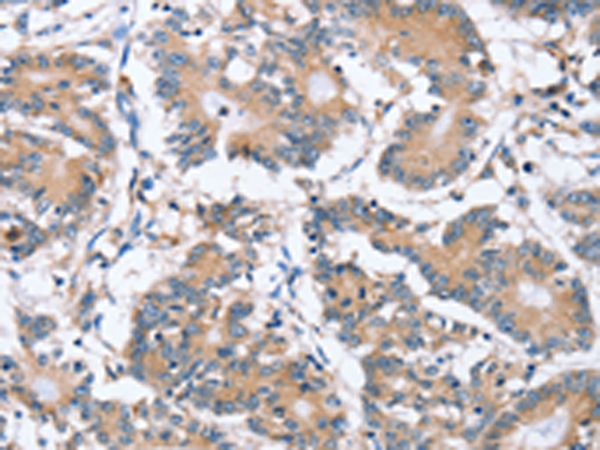
| WB | 咨询技术 | Human,Mouse,Rat |
| IF | 咨询技术 | Human,Mouse,Rat |
| IHC | 1/25-1/100 | Human,Mouse,Rat |
| ICC | 技术咨询 | Human,Mouse,Rat |
| FCM | 咨询技术 | Human,Mouse,Rat |
| Elisa | 1/1000-1/2000 | Human,Mouse,Rat |
| Aliases | PLCzeta; NYD-SP27; PLC-zeta-1 |
| Host/Isotype | Rabbit IgG |
| Antibody Type | Primary antibody |
| Storage | Store at 4°C short term. Aliquot and store at -20°C long term. Avoid freeze/thaw cycles. |
| Species Reactivity | Human |
| Immunogen | Fusion protein of human PLCZ1 |
| Formulation | Purified antibody in PBS with 0.05% sodium azide and 50% glycerol. |
+ +
以下是关于PLCZ1抗体的3篇参考文献及其摘要内容的简要概括:
1. **文献名称**:*"Phospholipase C-zeta (PLCZ1): A male infertility-associated factor with roles in oocyte activation"*
**作者**:Kashir J, et al.
**摘要**:该研究探讨了PLCZ1在精子介导的卵母细胞激活中的关键作用,指出PLCZ1突变或表达异常与男性不育相关。文中提到使用特异性PLCZ1抗体检测精子中该蛋白的缺失或异常定位,为临床诊断提供依据。
2. **文献名称**:*"Characterization of a novel monoclonal antibody against human PLCZ1 for the study of fertilization failure"*
**作者**:Nomikos M, et al.
**摘要**:研究团队开发了一种新型单克隆PLCZ1抗体,验证其特异性后应用于免疫荧光和Western blot,发现部分不育患者精子中PLCZ1表达显著降低,提示该抗体可用于辅助生殖技术中的病因筛查。
3. **文献名称**:*"PLCZ1 deficiency in sperm causes oocyte activation failure and infertility: therapeutic implications of antibody-based detection"*
**作者**:Yoon SY, et al.
**摘要**:通过PLCZ1抗体分析发现,部分特发性不育症患者精子缺乏功能性PLCZ1蛋白,导致卵母细胞无法激活。研究提出基于抗体检测的个性化辅助生殖治疗策略,如通过人工激活卵母细胞改善妊娠结局。
4. **文献名称**:*"Comparative analysis of PLCZ1 protein expression across mammalian species using species-specific antibodies"*
**作者**:Sato Y, et al.
**摘要**:该研究利用多种物种特异性PLCZ1抗体,比较了小鼠、人类和牛精子中PLCZ1的分布及表达差异,揭示了其在进化中的保守功能及潜在临床研究模型的选择依据。
以上文献均聚焦于PLCZ1抗体的开发、应用及其在不育症机制与诊断中的重要性。
The phospholipase C zeta 1 (PLCZ1) antibody is a critical tool for studying the role of PLCζ1. a sperm-specific enzyme essential in oocyte activation during fertilization. PLCZ1. encoded by the *PLCZ1* gene (human chromosome 12), triggers calcium oscillations in the oocyte by hydrolyzing phosphatidylinositol 4.5-bisphosphate (PIP2) to generate inositol 1.4.5-trisphosphate (IP3), which mobilizes intracellular calcium stores. This process is vital for resuming meiosis and initiating embryonic development. Mutations or deficiencies in PLCZ1 are linked to male infertility due to failed oocyte activation, even with intracytoplasmic sperm injection (ICSI).
PLCZ1 antibodies are widely used in research to detect PLCZ1 expression in spermatozoa, assess its localization (e.g., cytoplasmic vs. nuclear), and investigate functional abnormalities in infertile males. They are employed in techniques like Western blotting, immunofluorescence, and immunocytochemistry. Clinically, PLCZ1 antibodies may aid in diagnosing idiopathic male infertility and predicting ICSI outcomes. Recent studies also explore their potential in developing therapeutic strategies, such as recombinant PLCζ protein supplementation. However, variability in antibody specificity and assay standardization remain challenges. Overall, PLCZ1 antibodies are pivotal for advancing reproductive biology research and improving clinical management of fertilization-related disorders.
×